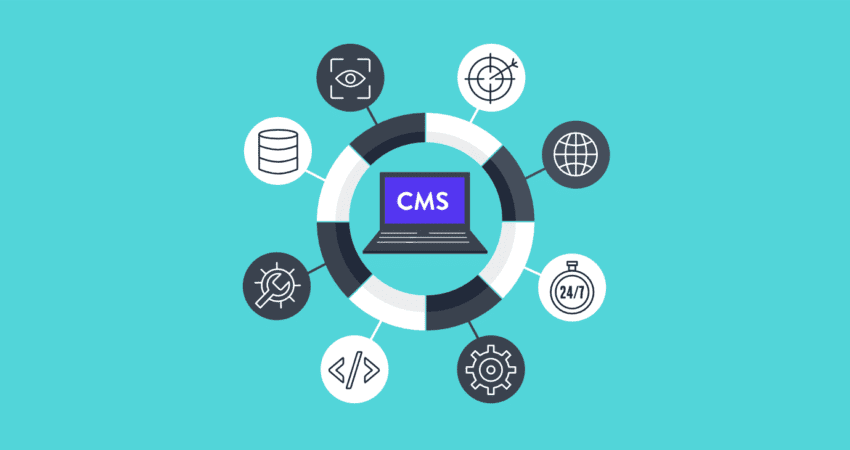
In the ever-evolving landscape of the digital marketplace, where trends shift swiftly and consumer expectations continually evolve, stands as a beacon of adaptability.
Recognizing the pivotal role of an effective Content Management System (CMS) in steering the success of website management, and its clients embark on a journey to not just establish but to continuously refine and elevate their online presence.
In an era where user engagement is synonymous with digital success, places emphasis on harnessing the power of a CMS website development company to dynamically respond to industry trends, user preferences, and technological advancements.
As we navigate this digital frontier, understanding the significance of CMS becomes not only a strategic advantage but a fundamental necessity for a company’s clients. Let’s delve into the intricacies of why CMS is not just a tool but an indispensable asset for modern website management.
The Integral Role of CMS in Fostering Inclusive Collaboration and Efficiency
Within the operational framework, the Content Management System (CMS) emerges as the linchpin of our digital pursuits, serving as the bedrock upon which innovation and seamless collaboration thrive.
This robust system not only provides a user-friendly interface but represents an inclusive tool that empowers both our technical experts and those without an extensive technical background. This inclusive accessibility underscores commitment to fostering a collaborative environment, where diverse talents converge to create, edit, and manage digital content with unparalleled efficiency.
The result is a dynamic workflow that facilitates timely updates, ensuring that digital landscape remains not just current but perpetually aligned with the forefront of relevant information. This commitment to accessibility and efficiency reflects dedication to delivering a superior online experience for a company’s internal team and the broader audience.
Essential Features of a Content Management System (CMS) for Streamlined Website Management
Efficiency and Time
Efficiency pulsates at the core of operational ethos, where every facet of endeavors is meticulously crafted for optimal performance. The well-oiled machinery that is our Content Management System (CMS) stands as a testament to this commitment, seamlessly streamlining the intricate processes of content creation and publishing.
Time is a precious resource, and the well-designed CMS acts as a catalyst in conserving this valuable asset for our team. This capability extends beyond saving time; it serves as a bridge that enables multiple contributors to work in concert, fostering a collaborative environment without causing disruptions to the overarching workflow.
In essence, the efficiency embedded in CMS is not merely a feature but a strategic advantage that propels our operations towards unparalleled productivity and collaborative synergy.
Content Organization and Structure for Success
Navigating the competitive digital landscape places a premium on the organization as the cornerstone of an exceptional user experience and robust SEO performance. Within this framework, the CMS platforms employed serve as indispensable tools, specifically designed to elevate content organization and structure.
This strategic approach is not just about aesthetics; it’s a deliberate effort to ensure a seamless navigation experience for every visitor to’s digital domain. Beyond the user-centric focus, the meticulous organization facilitated by our CMS platforms plays a pivotal role in enhancing the efficiency with which search engines crawl and index the website.
This dual functionality contributes significantly to the visibility of, ensuring that it stands out prominently in the expansive digital landscape.
Flexibility and Scalability
Adapting to the dynamic needs of diverse clientele, the Content Management System (CMS) is not just a technological solution but a strategic imperative. The spectrum of businesses served demands a CMS that mirrors the diversity and complexity of their operations.
Modern CMS solutions seamlessly cater to evolving needs, providing the flexibility and scalability required to accommodate businesses of all sizes. This adaptability is not a mere convenience; it is a deliberate choice to ensure that a website can grow organically alongside its clients.
The scalability inherent in the CMS eliminates the need for a disruptive and resource-intensive complete overhaul with each business expansion. This approach not only enhances operational efficiency but also positions a firm as a reliable partner capable of evolving in tandem with the ever-changing landscape of its diverse clientele.
User Permissions and Workflow Management
Within the collaborative tapestry of a firm’s environment, maintaining meticulous control over user permissions and content workflows emerges as a pivotal facet. The Content Management System (CMS) deployed isn’t just a technological tool; it’s a strategic instrument for fostering a controlled and secure collaborative ecosystem.
Empowering administrators, the CMS platforms grant precision in assigning specific roles and permissions. This deliberate customization delineates those who can undertake crucial actions such as content creation, editing, and publishing.
Beyond its administrative functionality, this feature serves as a robust security measure, fortifying’s digital infrastructure against unauthorized access or alterations. In essence, commitment to controlled content workflows through CMS not only enhances security but also ensures a seamless and orchestrated content creation process, vital for maintaining the integrity of digital presence.
Responsive Design and Cross-Device Compatibility
Acknowledging the diverse habits of the audience, where accessing websites spans across an array of devices, the mandate for a responsive design becomes paramount. The Content Management System (CMS) employed is not just a technical backbone; it’s a strategic enabler for ensuring an optimal user experience.
Equipped with advanced tools, CMS facilitates the creation and maintenance of responsive designs, thereby guaranteeing a seamless and consistent experience for users across desktops, tablets, and smartphones. This commitment to responsive design isn’t merely about user convenience; it aligns with the stringent criteria set by search engines for ranking.
By ensuring that’s digital presence adapts effortlessly to various devices, the CMS not only prioritizes user experience but also strategically positions for enhanced visibility and ranking in search engine results.
SEO-Friendly Features Optimized
Amidst the complexities of the digital landscape, the pivotal role of SEO in driving organic traffic cannot be overstated. Being attuned to the dynamics of the digital age integrates this understanding into its operational fabric. The Content Management System (CMS) adopted is not merely a technological foundation, but a strategic arsenal equipped for SEO excellence.
Infused with built-in SEO features or seamlessly integrating with potent SEO plugins, CMS becomes a dynamic tool for optimization. This includes customizable meta tags, clean URL structures, and the integration of sitemaps.
Through these features, a firm’s empowered to fine-tune and optimize its content for search engines, ensuring that its digital footprint is not just present but prominently visible in search engine rankings. The incorporation of SEO functionalities within a firm’s CMS isn’t a choice; it’s a deliberate strategy to enhance website visibility and fortify its position in the competitive digital landscape.
Analytics and Performance Tracking
In the realm of digital success, decoding user behavior stands as a cornerstone. Content Management System (CMS) is not merely a technological infrastructure; it’s an insightful conduit into understanding user dynamics.
Seamless integration with analytics tools amplifies this capability, providing’s administrators with invaluable insights into user behavior, traffic sources, and content performance. This amalgamation of CMS and analytics ushers in a data-driven approach, empowering the navigation of the digital landscape with precision.
By being armed with this wealth of information, a firm can make informed decisions, continually refining and enhancing the overall user experience. This synergy between CMS and analytics isn’t just a technological integration; it’s a strategic imperative, ensuring that every digital decision is grounded in a deep understanding of user interactions and preferences.
Also Read: Static Web Design vs. CMS Web Design: A Comprehensive Analysis
Conclusion
In conclusion, recognizing the adoption of a robust Content Management System is not just a technological choice but a strategic one for modern website management. The efficiency, flexibility, and feature-rich nature of CMS platforms contribute significantly to a firm’s success in the competitive digital landscape.
Prioritizing one’s online presence by investing in a reliable CMS is synonymous with investing in the sustainability and growth of the digital footprint.









